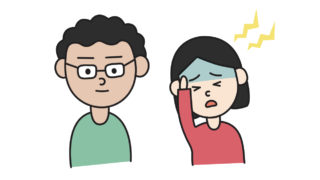Today, I will answer a question I received from my followers.
We are an international marriage and live in the United States.
My husband was diagnosed with Asperger’s Syndrome six months ago.
It’s been three months since he started seeing a counselor, but he hasn’t changed. On the contrary, he said, “I should live the way I want” and he started to argue with me more strongly than before.
Far from having any positive effect from counseling, I feel that my husband’s behavior is getting worse. I’m planning to talk to his counselor in the near future so he can convince my husband to change.
How long did it take for Alan to change after he started seeing a counselor?
By the way, I asked permission to address this question here from the person who sent it. I also told her what I was going to talk about. She is aware of her path towards improvement and she is working on it.
Since I have exchanged DMs with her several times, I have a little more information about her situation and the way she thinks. Since it is a private matter, I will not mention everything and, of course, I’m aware that I don’t know everything about their situation. So I will try to answer the question the best I can.
Mental care before it becomes severe
First, I think it is remarkable that her husband is going for counseling. I am sure there are a lot of people who are hoping for this. I have repeatedly told Alan to go but he did not, so I continued going for individual counseling for 1 year. I forced him to go for online counseling and physical counseling a couple of times, but he did not continue. It has been more than a year since I have stopped asking him to go for counseling, but one day, he started seeing a counselor on his own. It is strange, but I think that is how humans behave.
I believe humans can’t be forced to change easily using other people’s persuasion. In fact, I am convinced that their motivation to change needs to come from themselves. Currently, I am no longer seeing a counselor and only Alan is the one seeing one. The purpose of his visits does not seem to be to discuss only matters regarding Asperger’s but rather to talk about his mental well-being. I believe the purpose of going for counseling is different between Japan and America.
In America, there are lots of people who see a counselor with an open mind to discuss everyday matters. In Japan, people will only go see a therapist when the matter at hand become extremely critical or when the mental state of the person has become severe. However, appointments cannot be made right away and there are many who would feel embarrassed if the people around them learned that they are seeing a counselor.
I wish everyone doesn’t need to feel that way but rather make it a habit to take care for their mental health. It should be like taking care of your hair or teeth when you go see your hair stylist or your dentist.
What to expect from the lack of any significant change from my husband?
Regarding the lack of any significant change on the part of the husband, I can only say that Alan has not changed the way I wanted either. What I mean to say with this is that he didn’t become what I thought to be as “my ideal husband”.
I want to be clear that there are some behaviors that in my opinion are not acceptable. For example, if the issue with the husband is related to physical abuse, alcohol or financial issues, then I believe it is necessary for the individual to change because that behavior is bringing serious problems to the household and family, I definitely wanted my husband to change in terms of how he managed our money and we had multiple discussions until we reached an agreement. Even so, it took almost 1 year. It is difficult for them to change immediately, so I believe it is better to set a realistic goal in that regard. I believe each household has their unique situation and problems. Therefore, I believe that sometimes it is better to include a third party such as a counselor or specialized support institutions.
Sometimes I believe a problem can be like a long thread. If we let the problem fester, the thread will become entangled over a long period of time and it will also take a long time to unwind it.
What if your husband refuses to admit he has problems bringing adverse effect to his household? What if that situation has given you worries, frustration and stress for years and still there are no signs he will change?
In that case, I think the answer should come from deep inside you. You need to look into your deepest personal feelings and answer the following question: “If you assume your husband is not going to change, what do you want from the relationship?”
I strongly believe you shouldn’t devote your precious life to someone who brings you only suffering. Of course, we should look on the bright side, right? However, keep in mind that for those who have children, the distressed psychological state of the mother can be transmitted to the children.
Instead of being in a dependent relationship with your partner, you should make a choice based on your self-evaluation and the type of life you want for you and your loved ones. Whatever you decide, I hope you have the courage to take a step forward for the sake of your own life.
If you are holding on to the hope that your partner will eventually change, or if you hold the mindset that happiness will not come if your partner does not change, it’s very likely that you will go through a difficult time during the whole time until he eventually changes or not.
In my case, even though it’s sad to think about it, I made the decision to divorce him if our serious issues were not addressed by him. Although I would like to be with my beloved husband all my life, I realized that I also had the courage to end it.
Because, and this is especially important, the only one who can make you happy is none other than yourself.
People of Japan who are not used to being unable to comprehend each other
Regarding my husband’s reaction being different to what I expected from him or how I was irritated because he did not take any action unless I explicitly told him to, I eventually changed my way of thinking. In Japan, we learned from an early age to guess and project our own thoughts onto other people. For example, there are some actions and behaviors that we expect are the norm so we believe other people have the same way of thinking and we expect them to behave in the same manner.
I have written about this in my blog so I will put the link in the description.
The bottom line is that each person is unique, and we can be very different people especially in an international marriage.
I have spoken about this with an American Japanese counselor who has helped me as well as others who were in international marriages. It’s very likely that our Japanese culture can be disadvantageous in this regard if we try to build a good relationship between different people. When I think about it, I noticed some problem patterns in the relationship between Japanese people and foreigners. It’s not limited to a relationship between a couple but also adult relationships such as between fellow mothers, between teachers and caretakers as well as at the workplace.
The education system in Japan does not allow those who are different or those who have an exceptional individual ability to thrive. Instead, it tries to make everybody average. The education system in Japan may not develop the full potential of an individual.
Although the current education has probably improved slightly, I think all of us who are in their thirties or more have received similar education. I think that because of this, there is a predisposition towards having the idea that people around you must have similar thoughts, or the habit to try and conform to others and avoid being different. There is an uneasy a sense of unfamiliarity when we are unable to comprehend each other.
Being in a group gives us the sense of security and when the time comes, most of us are not able to act individually. In school, we are just waiting for instructions from an authority figure and the group constantly perform the same actions. However, when we are put in an unfamiliar environment or society, we are then told to think and act on our own which is something that contradicts how we were educated. We become confused.
Husband with Asperger’s who had a hard time especially because the wife was Japanese
In Japan, our ability to read the social atmosphere is forced upon us from an early age. The consequence is that we are not used to convey our desire explicitly. A common phrase in Japan is: “This is something you should know even without being told!” Now I think that this is a phrase that only exists in the Japanese language.
This is one of the barriers that I have encountered in terms of differences in culture when I first came to America to study.
Even if it is something minor, I noticed that I was not able to easily convey my feelings or thoughts to others using words. It is perfectly natural for others, who do not have the same thoughts as you, to think different. Do not get me wrong, I do not say that reading the atmosphere, the way the Japanese do, is a bad thing per se. There is also no need for either one to conform to the other.
My husband Alan, who has Asperger’s, had a particularly hard time especially because I was Japanese. More than the average American couple. As you know, people with Asperger’s have difficulties reading the feelings of others. If, in addition, we add the fact that we, Japanese, were taught from an early age to read atmosphere, then you can imagine how hard it must have been for him.
Even without Asperger’s or Cassandra, I think that the differences in culture can be a huge barrier for international couples.
One of the reasons that our marital relationship did not do well was because I had a narrow view of the world engraved in my mind. This includes the ability to read the atmosphere: “In situations like this, isn’t it normal to think this way and do it this way? Why do I have to tell you how to do it!?” This type of thinking is natural in Japan. Even though I understood this difference because I had the experience of working in America before meeting my husband, I tried to impose my Japanese “guessing” culture on my husband when we became a couple. I regret this. This was not a problem coming from my husband’s behavior but it’s one of the things I was able to improve myself.
One of my followers introduced the following reference material from a podcast. I want to thank that follower deeply.
“Overseas listening culture” and “Japanese guessing culture”
Coming to Canada, I was frustrated that others were not doing what I expected from them. When I complained to my husband and friends, they said: “Eh? But you didn’t tell me that?” It’s normal if we can’t understand you if you don’t say anything. It’s normal that you don’t get what you want if you don’t say it. It’s better to tell things upfront and feel relieved than to feel uncomfortable because you can’t say explicitly what you want!
Please do listen to it because I believe there are things you can learn from it. There are certain parts which are in English so you can probably listen to it together with your foreign partner.
Even if you are not in an international marriage, I think it will be helpful to you or your marriage to understand the particularities of our Japanese culture and realize that we, Japanese, have indeed such predisposition.
It is not advisable to request your partner’s counselor for matters that benefits you
After he started going to counseling, he said, “I should live the way I want” and began to argue against me more strongly than before. Far from having any positive effect on counseling, I feel that my husband’s behavior was getting worse. I’m planning to talk to his counselor in the near future so he can convince my husband to change.
When we went to the couple counseling for the first time, before the session began the counselor warned us, “There are occasions when I am requested, without the knowledge of the partner, to say things like ‘the husband is wrong’ or ‘the wife is wrong’. Please do not do that.”
I thought that perhaps there are many couples who wanted to have the counselor on their side. I think it is not a good advice to try and get your partner’s counselor on your side so it is better not to try that. The counselor is supposed to be in a neutral position, and if he were to accept such requests, I would think that the counselor is not behaving correctly. I have compiled the methods of choosing a counselor in my previous blog post so I will put the link in the description.
Your own way of life! Live like yourself
After going for the counseling, he started saying “I’m going to live the way I want to,” and started refuting my opinions stronger than before.
Somehow, I understand both you and his feelings.
The most important character during counseling is your own heart. You need to be honest to yourself and answer the following questions:
What are you thinking?
Why do you think so?
What do you want to do and why do you want to do it?
By asking yourself these questions during counseling, you somehow are forced to give them a deep thought. Ideally, you should be able to realize how you want to live and what type of person you want to be from now on.
“Live the way I want to live” if you were to take this phrase literally, it gives the impression of selfishness. However, I do not think that is the direct meaning. When my husband says things like that, it often means “I want to live the way I am.”
Excluding serious issues bringing dire problems to the household and family as mentioned previously, we should not try to change our husbands in such a way that he starts acting differently because his wife will become angry or emotional. That is not the way to build a healthy relationship.
On the contrary, a healthy marriage should be based on the firm, clear and individual thoughts of the husband and the wife. If this relationship is not based on common sense and mutual respect, I think the relationship would not go well. One of the reasons for marriage troubles happens when one partner tries to conform to the other while the other is oblivious to the needs of the other partner.
My husband and I were going to counseling sessions separately. As I mentioned previously, my husband is still seeing a therapist. Up until now, we would quarrel whenever we have a disagreement. However, going to counseling helped us develop our ability to understand how we feel and made our arguments smoother.
We still argue, of course, but now we can verbalize our thoughts and feelings. It’s not uncommon to ask about the other partner’s thoughts by saying, “This is how I think, but what do you think?”
If we disagree, we accept that our thoughts are different and try to reach a compromise. This way, we don’t have the situation in which one side tolerate and conform 100% to the other. We would discuss the matter and look for a middle ground that we can live with.
Even though we say that can reach a compromise, it’s not always easy. Of course, I still wanted the solution to be more on my side than the actual middle ground and I assume Alan has the same feeling. However, life is not perfect, and I think one of the secrets to live in harmony with another person is to accept that they are different from you.













